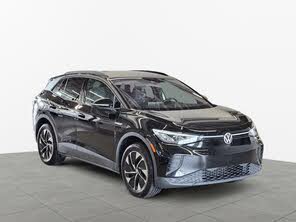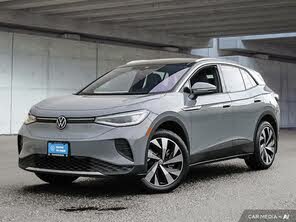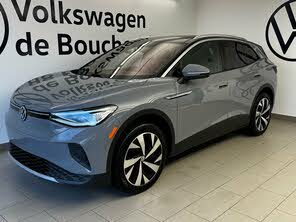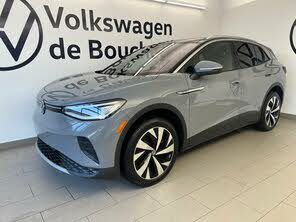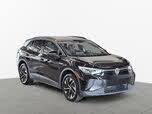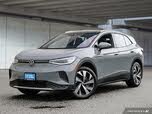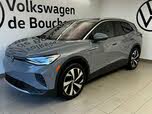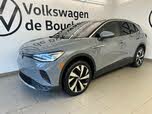2022 Volkswagen ID.4 vs 2022 Toyota 4Runner
Overview | |
MSRP$38,105 | MSRP$41,230 |
Average price$55,631 | Average price$39,200 |
Listings30 | Listings7 |
Ratings & Reviews | |
User Reviews | User Reviews |
Expert reviews7.0 out of 10 | Expert reviews |
2022 Toyota 4Runner Reviews SummaryFamily-hauling, kid-toting three-row SUVs have become the de facto vehicle in most suburban towns. Just look in any mall parking lot, and you’re bound to see countless Honda Pilots and Toyota Highlanders. So ubiquitous are these vehicles, you might forget that the definition of “Sport Utility Vehicle” is actually quite vast, and there are still new examples that have some connection to the segment’s rugged origins. The model year 2022 Toyota 4Runner is one such example. It may not be optimized for soccer practice or pizza-party duties, but it can certainly handle them. Just as crucially, it can also venture out where these mall-dwelling SUVs dare not go. If two years of a pandemic have taught us anything about ourselves, it's that the ability to get out on an adventure is more relevant than ever, and the 4Runner is one vehicle so-equipped to do it. | |
2022 Volkswagen ID.4 Reviews Summary | |
No video found | No video found |
Popular Features & Specs | |
Engine4.0L 270 hp V6 | Engine201 hp Electric |
Drive Train4X2 | Drive TrainRWD |
Seating Capacity7 | Seating Capacity5 |
Horsepower270 hp @ 5600 rpm | Horsepower |
EV Battery Capacity | EV Battery Capacity82 kWh |
MPG City16 | MPG City116 |
MPG Highway19 | MPG Highway98 |
Battery Charge Time (240V) | Battery Charge Time (240V)7.5 hours |
Engine | |
Engine Name4.0L 270 hp V6 | Engine Name201 hp Electric |
Torque278 lb-ft @ 4400 rpm | Torque |
Horsepower270 hp @ 5600 rpm | Horsepower |
Battery Charge Time (240V) | Battery Charge Time (240V)7.5 hours |
Drivetrain4X2 | DrivetrainRWD |
Fuel Economy | |
EV Battery Capacity | EV Battery Capacity82 kWh |
MPG City16 | MPG City116 |
MPG Highway19 | MPG Highway98 |
Interior | |
Seating Capacity7 | Seating Capacity5 |
Key Features | |
Navigation System | Navigation SystemOptional |
Safety | |
Front Crash Overall4 | Front Crash Overall5 |
Side Crash Overall5 | Side Crash Overall5 |
Dimensions & Capacity | |
Cargo Space47.2 cu ft | Cargo Space30.3 cu ft |
Curb Weight4400 lbs | Curb Weight4568 lbs |
Height71.5 in | Height64.6 in |
Length190.2 in | Length180.5 in |
Width75.8 in | Width72.9 in |
Wheelbase109.8 in | Wheelbase108.9 in |
Maximum Payload1700 lbs | Maximum Payload937 lbs |
Number of doors4 | Number of doors4 |
Maximum Towing Capacity5000 lbs | Maximum Towing Capacity2200 lbs |
Standard Towing Capacity5000 lbs | Standard Towing Capacity2200 lbs |
Overview | ||
MSRP | $38,105 | $41,230 |
Average price | $55,631 | $39,200 |
Listings | ||
Ratings & Reviews | ||
User reviews | ||
Expert reviews | 7.0 out of 10Read full review | |
Pros & cons | ||
Summary | Family-hauling, kid-toting three-row SUVs have become the de facto vehicle in most suburban towns. Just look in any mall parking lot, and you’re bound to see countless Honda Pilots and Toyota Highlanders. So ubiquitous are these vehicles, you might forget that the definition of “Sport Utility Vehicle” is actually quite vast, and there are still new examples that have some connection to the segment’s rugged origins. The model year 2022 Toyota 4Runner is one such example. It may not be optimized for soccer practice or pizza-party duties, but it can certainly handle them. Just as crucially, it can also venture out where these mall-dwelling SUVs dare not go. If two years of a pandemic have taught us anything about ourselves, it's that the ability to get out on an adventure is more relevant than ever, and the 4Runner is one vehicle so-equipped to do it. | |
Video | No video found | No video found |
Popular Features & Specs | ||
Engine | 4.0L 270 hp V6 | 201 hp Electric |
Drive Train | 4X2 | RWD |
Seating Capacity | 7 | 5 |
Horsepower | 270 hp @ 5600 rpm | |
EV Battery Capacity | 82 kWh | |
MPG City | 16 | 116 |
MPG Highway | 19 | 98 |
Battery Charge Time (240V) | 7.5 hours | |
Engine | ||
Engine Name | 4.0L 270 hp V6 | 201 hp Electric |
Torque | 278 lb-ft @ 4400 rpm | |
Horsepower | 270 hp @ 5600 rpm | |
Battery Charge Time (240V) | 7.5 hours | |
Drivetrain | 4X2 | RWD |
Fuel Economy | ||
EV Battery Capacity | 82 kWh | |
MPG City | 16 | 116 |
MPG Highway | 19 | 98 |
Interior | ||
Seating Capacity | 7 | 5 |
Key Features | ||
Navigation System | Optional | |
Safety | ||
Front Crash Overall | 4 | 5 |
Side Crash Overall | 5 | 5 |
Dimensions & Capacity | ||
Cargo Space | 47.2 cu ft | 30.3 cu ft |
Curb Weight | 4400 lbs | 4568 lbs |
Height | 71.5 in | 64.6 in |
Length | 190.2 in | 180.5 in |
Width | 75.8 in | 72.9 in |
Wheelbase | 109.8 in | 108.9 in |
Maximum Payload | 1700 lbs | 937 lbs |
Number of doors | 4 | 4 |
Maximum Towing Capacity | 5000 lbs | 2200 lbs |
Standard Towing Capacity | 5000 lbs | 2200 lbs |

By: CarGurus + AI
At CarGurus, our team of experienced automotive writers remain at the heart of our content operation, conducting hands-on car tests and writing insightful guides that are backed by years of industry experience. To complement this, we are harnessing AI to make our content offering more diverse and more helpful to shoppers than ever. To achieve this, our AI systems are based exclusively on CarGurus content, ratings and data, so that what we produce is both unique to CarGurus, and uniquely helpful to car shoppers.


